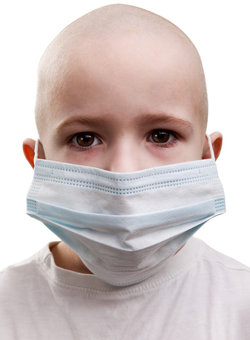 It is estimated that childhood cancer forms less than 1% of all cancers diagnosed every year. According to the American Cancer Society, a lot of progress has been made in treating pediatric cancer. Long-term survival is now expected of most children diagnosed with cancer, thanks to modern medicine. However, studies show that adult survivors of childhood cancer are prone to serious health risks. Many studies associate the health risks with the consequences of past cancer treatments (for example, radiation and chemotherapy).
It is estimated that childhood cancer forms less than 1% of all cancers diagnosed every year. According to the American Cancer Society, a lot of progress has been made in treating pediatric cancer. Long-term survival is now expected of most children diagnosed with cancer, thanks to modern medicine. However, studies show that adult survivors of childhood cancer are prone to serious health risks. Many studies associate the health risks with the consequences of past cancer treatments (for example, radiation and chemotherapy).
A 2013 study by St. Jude Children’s Research Hospital which involved a group of adults diagnosed with cancer about 25 years ago found 98% of participants had at least one chronic health condition including new cancers, lung problems, heart problems or memory or other neurocognitive problems. As the age increased, the risks appeared to increase as well and by age 45 around 80% of participants had at least a single life-threatening, serious or disabling condition. A 2014 study by Denmark researchers revealed that adult survivors of childhood cancer are at high risk of endocrine disorders. It was found that childhood cancer survivors are more likely to have had contact with hospitals for endocrine disorders than others.
Healthcare experts suggest that adults who had cancer as children should get regular medical screening for cancer as well as other conditions in order to identify health problems as early as possible so that it is easier to treat them. Family practice physicians have a great role to play in recommending appropriate tests and advice for these people. They should thoroughly examine the previous medical records that describe the treatments and drugs given for cancer, encourage follow-up visits and ask the patients to maintain a healthy diet and get enough exercise. Physicians should refer the patients to specialists if they find early symptoms of chronic conditions and transcribe the consultation reports accurately. This will help maintain all vital patient details that are required to understand the patient’s condition better.
Advancements in cancer treatment today help ensure that children being treated for cancer receive only less toxic doses of radiation and chemotherapy that can cause serious side effects. However, it is still important to encourage routine-checkups and discuss possible long-term complications with the child’s health with the primary care physicians and specialists. There must be accurate clinical documentation as well so that it is easier for both physicians and specialists to study the current and future complications and devise plans to address them effectively.

